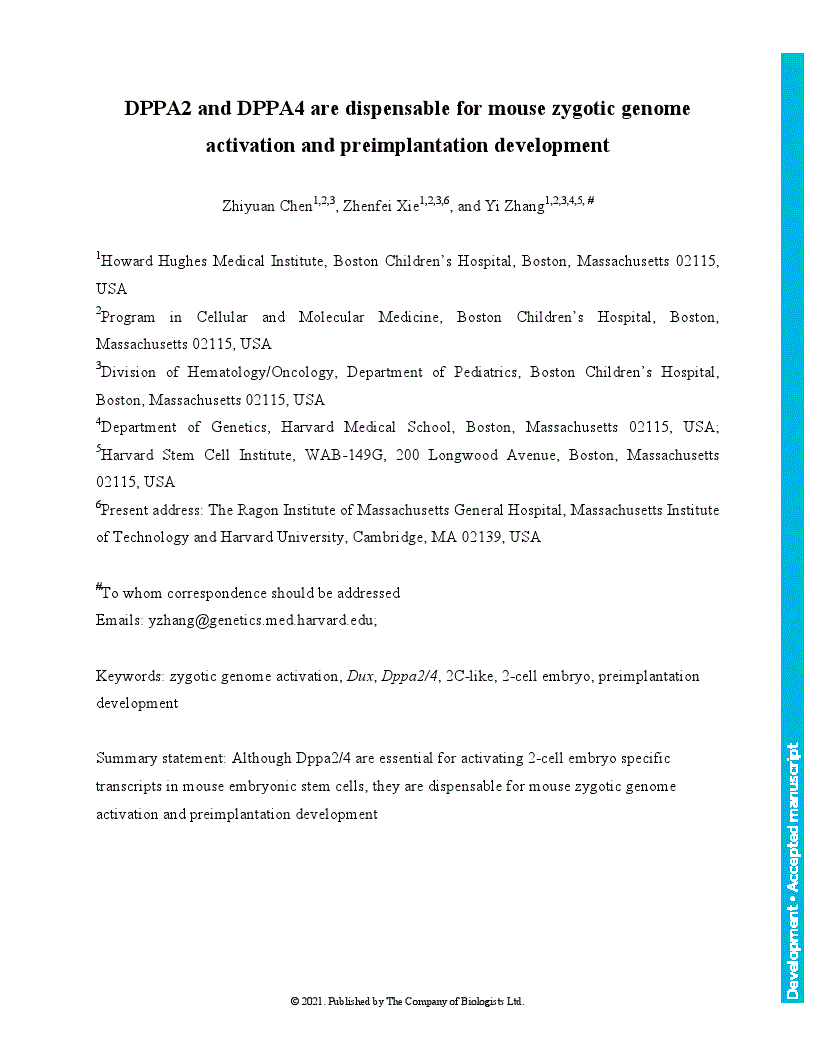How maternal factors in oocytes initiate zygotic genome activation (ZGA) remains elusive in mammals, partly due to the challenge of de novo identification of key factors using scarce materials. The 2-cell (2C) embryo like cells has been widely used as an in vitro model to understand mouse ZGA and totipotency given its expression of a group of 2C embryo-specific genes and its simplicity for genetic manipulation. Recent studies indicate that DPPA2 and DPPA4 are required for establishing the 2C-like state in mouse embryonic stem cells (ESCs) in a DUX-dependent manner. These results suggest that DPPA2 and DPPA4 are essential maternal factors that regulate Dux and ZGA in embryos. By analyzing maternal knockout and maternal-zygotic knockout embryos, we unexpectedly found that DPPA2 and DPPA4 are dispensable for Dux activation, ZGA, and preimplantation development. Our study suggests that 2C-like cells do not fully recapitulate 2-cell embryos in terms of 2C-gene regulation and cautions should be taken when studying ZGA and totipotency using 2C-like cells as the model system.
DPPA2 and DPPA4 are dispensable for mouse zygotic genome activation and preimplantation development
Present address: The Ragon Institute of Massachusetts General Hospital, Massachusetts Institute of Technology and Harvard University, Cambridge, MA 02139, USA
- Award Group:
- Funder(s): Howard Hughes Medical Institute
- Award Id(s): Yi Zhang
- Funder(s):
- Award Group:
- Funder(s): Eunice Kennedy Shriver National Institute of Child Health and Human Development
- Award Id(s): R01HD092465
- Funder(s):
- Award Group:
- Funder(s): Eunice Kennedy Shriver National Institute of Child Health and Human Development
- Award Id(s): K99HD104902
- Funder(s):
Currently Viewing Accepted Manuscript - Newer Version Available
- Split-screen
- Views Icon Views
- Open the PDF for in another window
-
Article Versions Icon
Versions
- Version of Record 21 December 2021
- Accepted Manuscript 08 December 2021
- Share Icon Share
-
Tools Icon
Tools
- Search Site
Zhiyuan Chen, Zhenfei Xie, Yi Zhang; DPPA2 and DPPA4 are dispensable for mouse zygotic genome activation and preimplantation development. Development 2021; dev.200178. doi: https://doi.org/10.1242/dev.200178
Download citation file:
Advertisement
Call for papers: Uncovering Developmental Diversity

Development invites you to submit your latest research to our upcoming special issue: Uncovering Developmental Diversity. This issue will be coordinated by our academic Editor Cassandra Extavour (Harvard University, USA) alongside two Guest Editors: Liam Dolan (Gregor Mendel Institute of Molecular Plant Biology, Austria) and Karen Sears (University of California Los Angeles, USA).
Choose Development in 2024

In this Editorial, Development Editor-in-Chief James Briscoe and Executive Editor Katherine Brown explain how you support your community by publishing in Development and how the journal champions serious science, community connections and progressive publishing.
Journal Meeting: From Stem Cells to Human Development

Register now for the 2024 Development Journal Meeting From Stem Cells to Human Development. Early-bird registration deadline: 3 May. Abstract submission deadline: 21 June.
Pluripotency of a founding field: rebranding developmental biology

This collaborative Perspective, the result of a workshop held in 2023, proposes a set of community actions to increase the visibility of the developmental biology field. The authors make recommendations for new funding streams, frameworks for collaborations and mechanisms by which members of the community can promote themselves and their research.
Read & Publish Open Access publishing: what authors say

We have had great feedback from authors who have benefitted from our Read & Publish agreement with their institution and have been able to publish Open Access with us without paying an APC. Read what they had to say.



